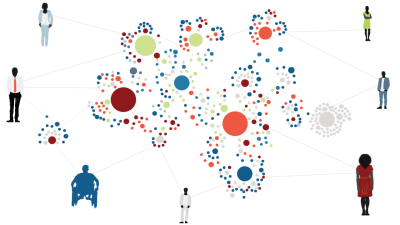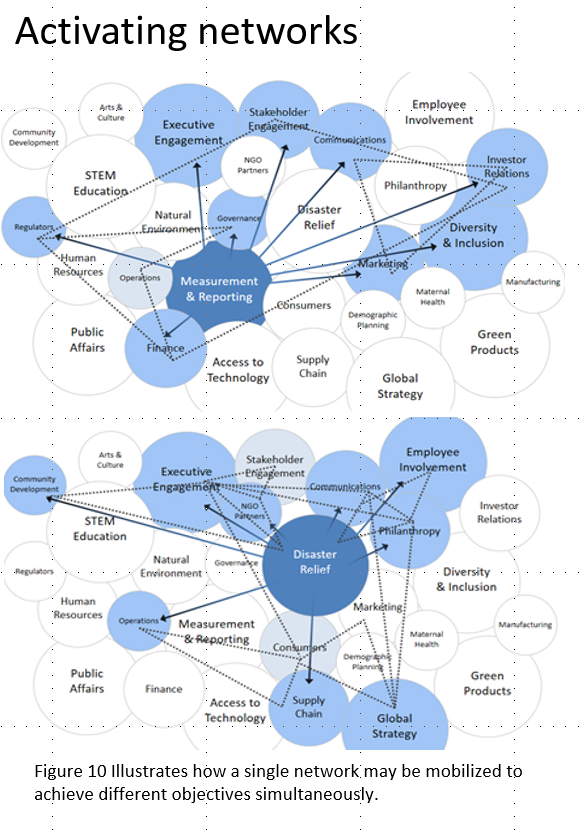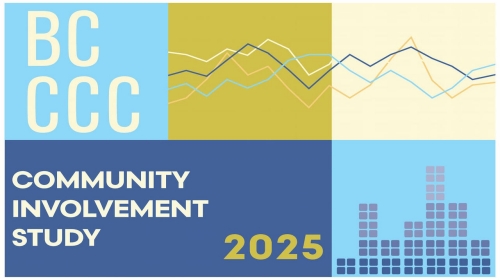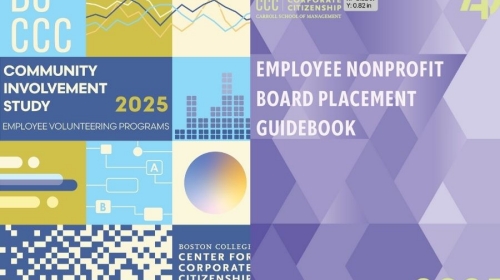WEBINAR: This webinar explores how to measure and communicate your organization's social impact with proven frameworks and strategies that matter to stakeholders.
The importance of networks and influence for CSR professionals

New research finds that networking and interdepartmental engagement are vital to demonstrating and delivering on the value of corporate citizenship.
The Profile of the Professionals 2020 study, a survey of more than 800 corporate citizenship professionals, finds that people in CSR roles frequently engage with other departments in their company to achieve their objectives, most commonly corporate communications, public relations/affairs, human relations, marketing, and legal. Strong communication skills emerge as an integral aspect of corporate citizenship work, as a majority of respondents choose communication as one of the top three skills needed to succeed in the corporate citizenship profession.
Tapping into your network to gather the wisdom of your colleagues can be a real advantage to achieving success in CSR work. When approaching any conversation with people in other departments, ask your colleague what success would look like for them in their roles. The words they use in their response are important. They have different performance metrics and will use different terminology than you use in your corporate citizenship work. By learning the language that your colleagues use in describing a successful initiative, you can use it to better connect your corporate citizenship work to achieving their business objectives.
Connecting your corporate citizenship strategy to business imperatives gives you a roadmap for how to build your network of influence. This is accomplished best by identifying the people who have performance objectives that your work will support—and who therefore will have a vested interest in working together, which will, in turn, help you achieve your objectives. For example, if you know your colleagues in HR have an objective to increase employee engagement, can your program offer choice or professional development program aspects to help achieve those objectives? Does your sustainability manager need help reducing energy usage or paper? You can help communicate the environmental impacts in your sustainability report and reinforce environmental values through green teams. Checking in to ensure that you are maximizing every effort goes both ways. Are you responsible for managing your company’s disaster relief efforts? If so you’ll need to check in with logistics, HR, and communications. Are you working on your company’s sustainability report? You should talk to people in many different operational units. You can also initiate ideas for how to achieve business objectives more efficiently and sustainably. Have you identified employee engagement as a citizenship business objective? Then someone in HR should be one of your first connections. Do you think you can reduce your water impact? Connect with your environment department, health and safety team, engineering group, and operations colleagues to get their buy-in and help. Is there a reputation or brand-building opportunity for you? Work with your communications and marketing team. You may not be leading an army, but you can mobilize one by connecting your objectives to their definitions of success. Building an engaged and motivated network will be absolutely fundamental to the success of your program.
 These two diagrams (pictured at left) illustrate the interconnectedness of all areas of your business when it comes to implementing and experiencing your corporate citizenship program. The first shows the network you need to build in order to implement measurement and reporting processes effectively, and the second uses the example of a disaster relief effort. They illustrate how a single network structure can support two very different activities (sometimes simultaneously).
These two diagrams (pictured at left) illustrate the interconnectedness of all areas of your business when it comes to implementing and experiencing your corporate citizenship program. The first shows the network you need to build in order to implement measurement and reporting processes effectively, and the second uses the example of a disaster relief effort. They illustrate how a single network structure can support two very different activities (sometimes simultaneously).
The reason networks are so successful is because each part builds on the strengths of the other; being flexible, they give an organization the stability it requires. If you have a strong network structure, you have a flexible and resilient team.
Of course, ideas don’t come only from within your company. Use your powerful BCCCC peer network to expand your thinking about what is possible. We provide opportunities to connect through our online member community, through our monthly Member Meetups and through our online courses. Use your network to achieve more with your corporate citizenship investments!
This blog post is adapted from 21st Century Corporate Citizenship: A Practical Guide to Delivering Value to Society and Your Business by Dave Stangis and Katherine V. Smith.
Related Content
RESEARCH BRIEF - Researchers investigated how ESG activities help or hurt financial performance, using nine years of data from over 1,200 global companies.
RESEARCH BRIEF - Researchers analyzed 4 US energy exchange-traded funds (ETFs) over 15 years, including 2 dirty energy funds tracking fossil fuel companies and 2 clean energy funds tracking renewable energy companies.
RESEARCH BRIEF - Researchers conducted a survey, which measured perceptions of CSR and ethical leadership within the manufacturing and service industries.
WEBINAR: This webinar explores how corporate giving will be reshaped by the One Big Beautiful Bill. Hear directly from corporate citizenship leaders as they share innovative, real-world strategies that deliver impact for communities and results for business.
This study explores shifting trends in employee volunteering, corporate giving, and other means of corporate community involvement.
This guidebook offers insights on placing employees in nonprofit board service roles.
This study explores shifting trends in employee volunteering, corporate giving, and other means of corporate community involvement.








